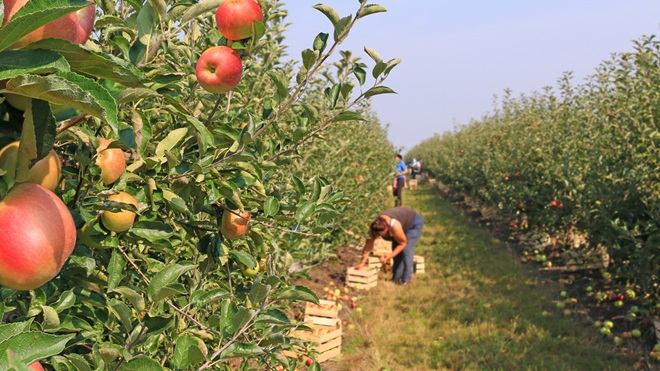Need to know
- Modern slavery is often found in industries heavily reliant on migrant labour
- As Australia's temporary migration resumes, experts are concerned about conditions for workers
- Key reforms, such as a national redress scheme for victims of modern slavery, are yet to be enacted
For the last two years Australia has been effectively walled-off from the outside world, with both temporary and permanent migration severely limited or stopped altogether.
In some industries, usually reliant on temporary migrant labour, this has led to a worker shortage, but for the workers themselves, the shortage has had a positive effect in some cases.
"Employers are finding it hard to find workers and this is giving the workers a bit more agency to choose their employer," Tim Nelthorpe, a farm work organiser at the United Workers Union told CHOICE.
The sectors which are highly reliant on migrant labour are also sectors where we have previously seen forced labour and modern slavery in Australia
The sectors which are highly reliant on migrant labour are also sectors where we have previously seen forced labour and modern slavery in Australia, according to those on the frontlines. As temporary migration resumes, there are concerns that modern slavery won't be far behind.
Not all forms of worker exploitation or underpayment are defined as modern slavery. Modern slavery occurs when the worker is forced or coerced into working. This could include things like a worker having their passport withheld by the employer or being threatened with deportation for not accepting working conditions.
While Australia does have a Modern Slavery Act, as explored in a previous CHOICE investigation, its impact is limited and experts are calling for the Act to be strengthened.
Troubled sectors
Carolyn and Fuzz Kitto are the co-directors of Be Slavery Free, a coalition of about 25 organisations which has been working to end modern slavery since 2007.
The Kittos told CHOICE that the agricultural industry, in particular fruit and vegetable picking, has seen many forced labour scandals. Other industries of concern include contracted cleaning staff, domestic helpers, meat processing and security staff. And as international students return to Australia, the entire hospitality industry is an area that concerns worker advocates.
"One of the biggest areas of concern is bonded labour, which means the worker takes out a loan to pay the labour agent who gets them to Australia to find a job," Fuzz Kitto says.
One of the biggest areas of concern is bonded labour, which means the worker takes out a loan to pay the labour agent who gets them to Australia to find a job
Fuzz Kitto, Be Slavery Free
Labour agents, people who work bringing in overseas workers to meet labour vacancies in Australia, are regulated differently in each state or territory, with Victoria and Queensland having the best worker protection systems, according to Fuzz.
Alison Rahill, the executive officer at the Australian Catholic Anti-Slavery Network, highlighted some other industries of concern, including laundry services, construction, manufacturing and food services.
"Pretty much anything where English is not necessarily something that's needed for the job, and there is a reliance on temporary workers, if you look you'll find workers that are vulnerable," Rahill says.
Redress and justice
Rahill says one of the "least mature" examples of Australia's approach to modern slavery is the failure to provide protections for its victims, especially victims of forced labour or trafficking.
She says the lack of a national redress system for victims, most notably visa protections, means workers are too scared to come forward and report their working conditions.
Many don't raise their voice about exploitation because, if they do, they face the loss of their employment and therefore the loss of their residency
Matt Kunkel, Migrant Workers Centre
"The most likely outcome for someone being found in a supply chain as a victim of modern slavery crimes is that they will end up in a detention centre being deported rather than being recognised as a victim of crime," she says.
Matt Kunkel, CEO of the Migrant Workers Centre in Melbourne, agrees with that view. He calls for a "justice visa", or an authorisation to allow exploited workers to stay in the country for a period of time and work rather than face deportation.
"Many people don't raise their voice about exploitation because, if they do, they face the loss of their employment and therefore the loss of their residency," he says.
Recommendations not implemented
The federal government's National Agricultural Labour Advisory Committee was set up in 2019 as an independent body to advise on labour issues, including migrant labour in the agricultural sector.
In 2020 the committee delivered a comprehensive report with a suite of recommendations to reform the sector and improve protections for migrant workers. Tim Nelthorpe, from United Workers Union says the majority of these reasonable recommendations have never been implemented.
Many of the systems that have previously led to exploitation and modern slavery remain unchanged
Kunkel says that many of the systems that have previously led to exploitation and modern slavery remain unchanged.
"The fact is we haven't addressed the systemic issues that drive this exploitation and drive these types of offences. Which means we're likely to see a return to business as usual for those unscrupulous employers," he said.
"Further action is absolutely necessary if we're going to address forced labour and modern slavery."
We're on your side
For more than 60 years, we've been making a difference for Australian consumers. In that time, we've never taken ads or sponsorship.
Instead we're funded by members who value expert reviews and independent product testing.
With no self-interest behind our advice, you don't just buy smarter, you get the answers that you need.
You know without hesitation what's safe for you and your family.
And you'll never be alone when something goes wrong or a business treats you unfairly.
Learn more about CHOICE membership today
Stock images: Getty, unless otherwise stated.



